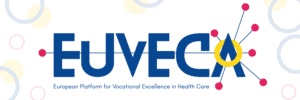The EUVECA Baseline Report was published earlier this year with interesting insights, serving as the project scientific foundation. The report encompasses, among others, a comprehensive European policy review, a scoping literature review, and primary empirical data collection to conduct European and regional needs analyses.
To understand how to translate the theoretical findings of the report into practical terms, a workshop was organised on 8 September 2023 bringing together EUVECA partners and external experts from the health field. They discussed the Baseline Report results and explored how to make practical use of them. Our valued pan-European experts from the research, medical, digital health, and policy-making field, namely Cécile Dury, Dr. Sanna Rimpiläinen, Hanne Smidt Sodergard, Linda Justi, Prof. Kerryn Butler-Henderson, Christoph Spegele, were part of the online workshop.
In a rapidly evolving world, the health care sector faces unprecedented challenges and opportunities. The need for healthcare professionals with 21st century skills to adapt to mega-trends in healthcare is greater than ever. This is where the EUVECA project comes into play, with a mission to reshape health care education and prepare healthcare professionals for the future.
The EUVECA project places a strong emphasis on:
Competence development: EUVECA aims to foster competence development to create a sustainable healthcare sector. It focuses on six mega-trends shaping healthcare’s future.
21st century skills: Ensuring that healthcare professionals possess the skills necessary to navigate these mega-trends effectively.
Collaboration: EUVECA collaborates with existing health ecosystems in different regions to foster innovation and cooperation.
Breaking silos: EUVECA seeks to break down educational silos and promote a holistic view of healthcare education and training.
Key Findings from the European Baseline Report
The European Baseline Report serves as a foundation for the project’s goals and activities. Key takeaways include that there are certain training needs for healthcare professionals and medical students. The most prominent training needs identified include creativity, innovation skills, and ICT literacy. Non-technical skills are often overlooked in formal healthcare education, leaving a gap that EUVECA aims to fill.
Furthermore, the report highlighted that simulation-based training is gaining importance in the healthcare sector, as is interprofessional training.
In total, EUVECA’s focus spans six areas critical for the sustainability of society and the healthcare sector: Digital, Industrial, Health education, sustainability, social policy & employment, higher & vocational education. With those areas EUVECA is building strong relationships with regional stakeholders as an ongoing process, with the aim of establishing seven regional hubs.
Discussion Highlights
Participants shared their vision of what the EUVECA platform could look like and how it could be used by future users. Furthermore, participants shared their impressions and insights into the project’s relevance to their work. The EUVECA platform, a current work in progress, aims to facilitate connections between students and healthcare professionals across borders, enabling knowledge sharing and collaboration. EUVECA wants to establish itself as a European standard for healthcare education, offering an EU perspective on various healthcare areas, and clearing the way for cross-border connections.
Moreover, the participants stressed the importance of practical training alongside theoretical education. As an example, the digital health education in Australia was given. Australia’s approach to digital health education includes face-to-face training and offers internship opportunities in order to enable students to implement their theoretical knowledge into practical terms.
In addition, active learning, adaptability to new technologies, and the importance of face-to-face and hands-on training were key aspects discussed. The participants also emphasised the need for a platform that offers international collaboration, simulation training, a focus on sustainability, and creative, user-friendly materials.
Conclusion
During the expert workshop, EUVECA proved that it is a forward-thinking initiative, aligning with healthcare education and the demands of the 21st century. By focusing on mega-trends, 21st-century skills, and collaboration, EUVECA seeks to create a brighter and more sustainable future for the healthcare sector across Europe and beyond. With enthusiastic participants and a clear vision, EUVECA is poised to make a significant impact on healthcare education.


